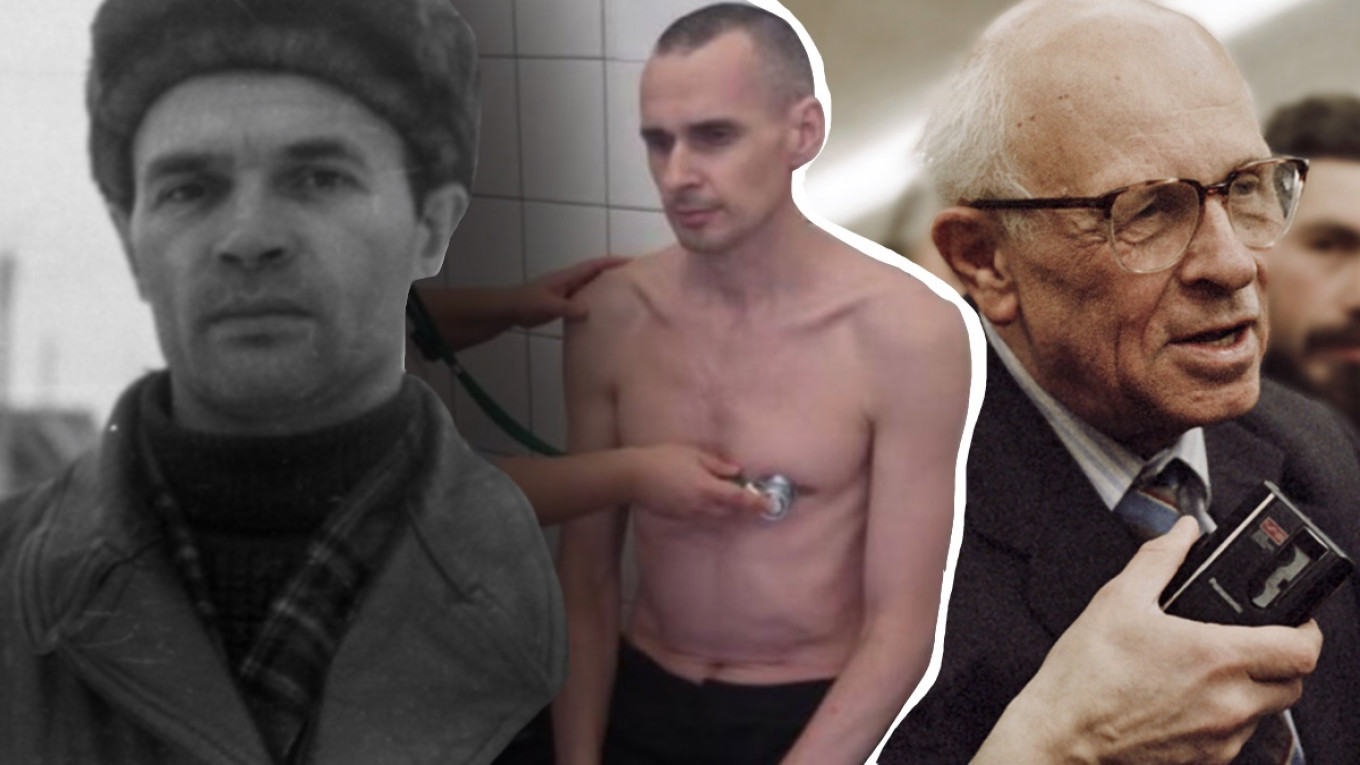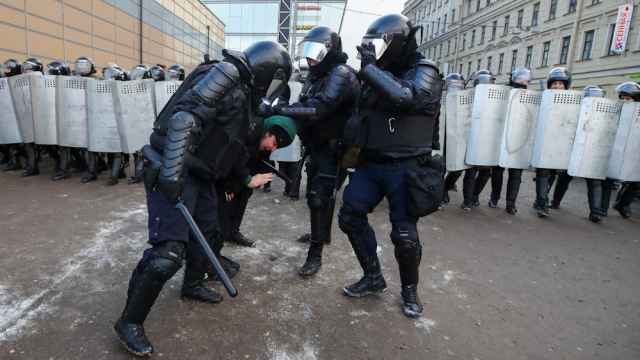Jailed Kremlin critic Alexei Navalny announced Wednesday that he is going on hunger strike to demand medical treatment and an end to “torturous” sleep deprivation in one of Russia’s most notorious prison colonies.
Hunger strikes as a tool of protest date back to the Soviet era, when solo dissidents or even entire groups of prisoners would forgo eating — sometimes fatally — in hopes of gaining their demands.
The tactic has continued into modern-day Russia, with activists protesting their treatment in prison or raising awareness of political causes.
Here is a list of some of the most prominent figures to have gone on hunger strike in the Soviet Union and Russia:
1969: Alexander Ginzburg
Leading Soviet dissident Alexander Ginzburg went on hunger strike for 27 days after he was barred from marrying his fiancee while he was in a labor camp. He would go on to become a founding member of the Moscow Helsinki Group before being expelled from the Soviet Union over his human rights advocacy.
1974, 1981, 1985: Andrei Sakharov
Soviet nuclear physicist and human rights advocate Andrei Sakharov went on hunger strike several times. In 1974, he launched a six-day strike aimed at pressing U.S. President Nixon and Soviet leader Leonid Brezhnev to address rights problems, especially those faced by “prisoners of conscience.”
In 1984 and again in 1985, Sakharov went on strike to demand that his wife be allowed to go abroad for medical treatment. Both times, he was hospitalized and allegedly force-fed.
1986: Anatoly Marchenko
Soviet dissident Anatoly Marchenko went on hunger strike several times throughout his life. He died in a prison hospital at age 48 following a three-month hunger strike to demand the release of all Soviet prisoners of conscience. His death sparked a worldwide outcry and would be a key factor in Soviet leader Mikhail Gorbachev’s granting of mass amnesty to political prisoners the next year.
2013: Nadya Tolokonnikova and Maria Alyokhina
Pussy Riot member Maria Alyokhina went on hunger strike for 11 days in March 2013 over claims that prison officials were attempting to turn fellow inmates against her by ramping up security requirements ahead of her parole hearing. Alyokhina had been sentenced to two years in a penal colony over the punk-activist group’s 2012 “Punk Prayer” performance in Moscow’s Christ the Savior Cathedral. She ended her hunger strike after her demands were met.
In September of that year, fellow Pussy Riot member Nadya Tolokonnikova, in prison on the same charges, announced a hunger strike to protest what she called slave labor conditions at her prison colony. She also accused a prison official of threatening to kill her. She ended her strike after nine days due to her health deteriorating.
2015-2016: Nadiya Savchenko
Ukrainian pilot Nadiya Savchenko went on hunger strike twice while imprisoned in Russia on charges of killing two Russian journalists during the war in eastern Ukraine which she denied. Her first hunger strike in prison lasted 83 days.
She announced a new hunger strike in April 2016 to demand that she be returned to her home country. A month later, she was freed in a prisoner swap between Russia and Ukraine.
2018: Oleg Sentsov
Ukrainian filmmaker Oleg Sentsov went on hunger strike for 145 days in a Russian prison, where he was serving a 20-year sentence on terrorism charges that rights advocates say were trumped-up. The director had been living in Crimea when Russia annexed it from Ukraine in 2014 and was a vocal opponent of the takeover.
Sentsov abandoned his hunger strike after his health became "critical" and prison officials allegedly threatened to force-feed him. He was later released in a 2019 prisoner swap with Ukraine.
2019: Lyubov Sobol
Lyubov Sobol, a lawyer for Navalny's Anti-Corruption Foundation, announced a hunger strike in summer 2019 to protest the exclusion of opposition candidates including herself from the Moscow City Duma elections.
She ended her month-long strike out of concern for the health of one of her aides who also went on hunger strike.
A Message from The Moscow Times:
Dear readers,
We are facing unprecedented challenges. Russia's Prosecutor General's Office has designated The Moscow Times as an "undesirable" organization, criminalizing our work and putting our staff at risk of prosecution. This follows our earlier unjust labeling as a "foreign agent."
These actions are direct attempts to silence independent journalism in Russia. The authorities claim our work "discredits the decisions of the Russian leadership." We see things differently: we strive to provide accurate, unbiased reporting on Russia.
We, the journalists of The Moscow Times, refuse to be silenced. But to continue our work, we need your help.
Your support, no matter how small, makes a world of difference. If you can, please support us monthly starting from just $2. It's quick to set up, and every contribution makes a significant impact.
By supporting The Moscow Times, you're defending open, independent journalism in the face of repression. Thank you for standing with us.
Remind me later.






